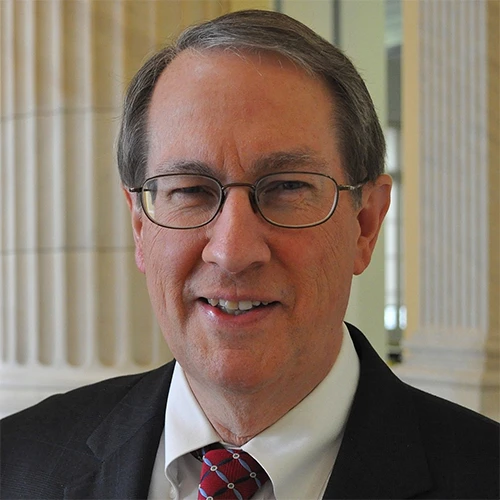In the early days of the 118th Congress, Rep. Darrell Issa, the newly-named Chairman of the House Intellectual Property Subcommittee, has an opportunity to make progress on a range of issues that are critical for the future of our intellectual property system, and therefore American innovation. Congressman Issa previously led this subcommittee when I had the honor of chairing the full Judiciary Committee and I know firsthand that he is in a unique position to help modernize and increase transparency in the patent system, allowing American inventors to develop the next generation of cutting-edge technologies. He understands that intellectual property is not a partisan issue, and will work with members of both parties in this divided Congress to find common ground and prioritize building a patent system that will allow for greater economic growth in the United States for years to come.
Chairman Issa was one of the original co-sponsors of the America Invents Act of 2011 (AIAAmerica Invents Act of 2011. AIA made modest reforms, most notably moving the U.S. to a first-inventor-to-file system more aligned with foreign practice, but also including expanding prior user rights to all patent-eligible subject matter, and instituting a post-grant review proceeding.), which, as many know, was a much-needed overhaul of the U.S. patent system and created the Patent Trial and Appeal Board (PTABPatent Trial and Appeal Board. Reviews adverse decisions of examiners on written appeals of applicants and appeals of reexaminations, and conducts inter partes reviews and post-grant reviews. The Board also continues to decide patent interferences, as it was known as the Board of Patent Appeals and Interferences (BPAI) before the AIA.) at the Patent Office. He has had a front-row seat to the law’s development, implementation, and evolution and is extremely well positioned to help shape any additional modifications over the next two years.
From the time he joined Congress, Chairman Issa has been an advocate for ending abusive patent practices that harm American innovators. The AIAAmerica Invents Act of 2011. AIA made modest reforms, most notably moving the U.S. to a first-inventor-to-file system more aligned with foreign practice, but also including expanding prior user rights to all patent-eligible subject matter, and instituting a post-grant review proceeding. did just that. In the years immediately following its implementation, abusive litigation declined and the United States economy became more productive as a result. However, in more recent years, key components of the law have been repeatedly diminished and the AIAAmerica Invents Act of 2011. AIA made modest reforms, most notably moving the U.S. to a first-inventor-to-file system more aligned with foreign practice, but also including expanding prior user rights to all patent-eligible subject matter, and instituting a post-grant review proceeding. remains a target of proposed changes that would even further erode its intended value. In an era where patent trolls remain a fixture in legal disputes, both in federal courts and at the U.S. International Trade Commission, Chairman Issa’s steady hand will be required to protect and strengthen the AIA’s effective reforms and take new steps to untether American innovators from the anchor that is costly, abusive patent litigation.
Reliable access to PTABPatent Trial and Appeal Board. Reviews adverse decisions of examiners on written appeals of applicants and appeals of reexaminations, and conducts inter partes reviews and post-grant reviews. The Board also continues to decide patent interferences, as it was known as the Board of Patent Appeals and Interferences (BPAI) before the AIA. review will likely continue to be a fraught topic, with debate around the previous Director’s NHK-Fintiv rule yet to be entirely resolved. As Chairman Issa said in 2021 as part of an amicus brief urging the Supreme Court to make the PTABPatent Trial and Appeal Board. Reviews adverse decisions of examiners on written appeals of applicants and appeals of reexaminations, and conducts inter partes reviews and post-grant reviews. The Board also continues to decide patent interferences, as it was known as the Board of Patent Appeals and Interferences (BPAI) before the AIA. more accessible, “a major achievement of the AIAAmerica Invents Act of 2011. AIA made modest reforms, most notably moving the U.S. to a first-inventor-to-file system more aligned with foreign practice, but also including expanding prior user rights to all patent-eligible subject matter, and instituting a post-grant review proceeding. was to create effective, efficient post-issuance review procedures that could meaningfully test the validity of issued patents.” I expect him to continue to be a champion for patent quality and measures to ensure that low-quality patents are not able to be weaponized in our courts.
New trends have emerged in the patent space that require the IP subcommittee’s attention. Third-party litigation financing (TPLF) investment strategies have gained popularity, with some states adopting new policies that would make it easier for these financiers to operate with minimal oversight and regulation. Groups like the U.S. Chamber of Commerce Institute for Legal Reform have sounded the alarm that TPLF poses a serious national security threat, a sentiment that 14 state Attorneys General recently echoed in a letter to the Department of Justice.
Due to the high costs for defendants and high payouts associated with patent litigation, third-party funders have increasingly focused on IP. Last year alone, at least 30% of patent lawsuits were backed by third-party funding agreements, and all signs point to that number growing as new investments pour in. A vocal proponent of transparency and oversight, Chairman Issa has previously introduced legislation that would require plaintiffs to disclose any TPLF agreements in class action lawsuits filed in federal courts and of claims that are aggregated into a federal multidistrict litigation (MDL) proceeding. Now, as the Chairman of the IP Subcommittee, he will be able to go further and use the committee’s critical investigatory and oversight powers to shine light on the litigation funders seeking to use our nation’s courts to extort large payouts from businesses and innovators.
The 118th Congress will need to find bipartisan solutions to pressing problems. As I have written before, patent and transparency issues provide an opportunity for both parties together to support businesses and entrepreneurs. During my time in Congress, I had the privilege of working closely with Congressman Issa to solve a range of IP-related problems and I look forward to watching him use his new position to strengthen American innovation and competitiveness.

